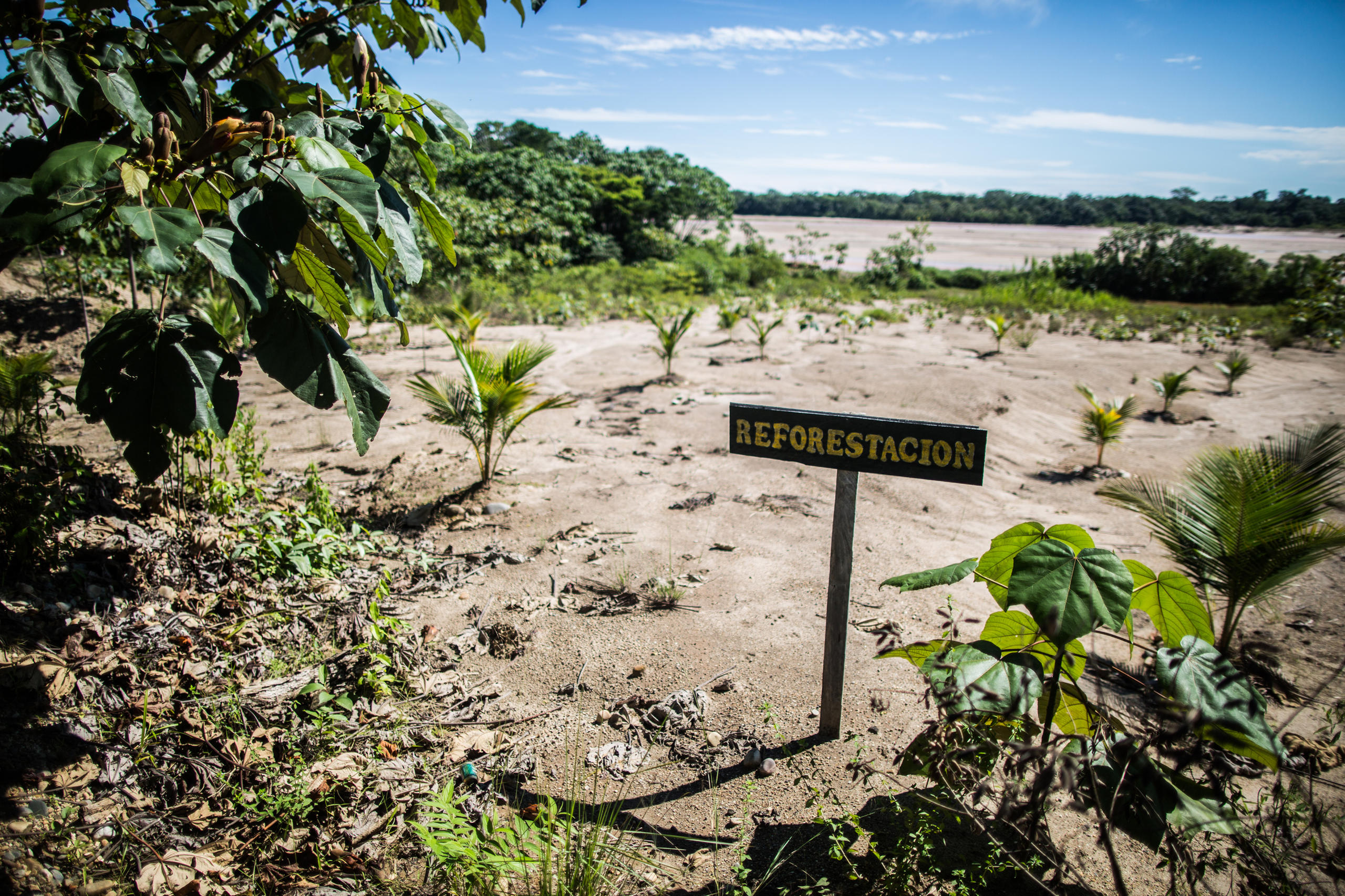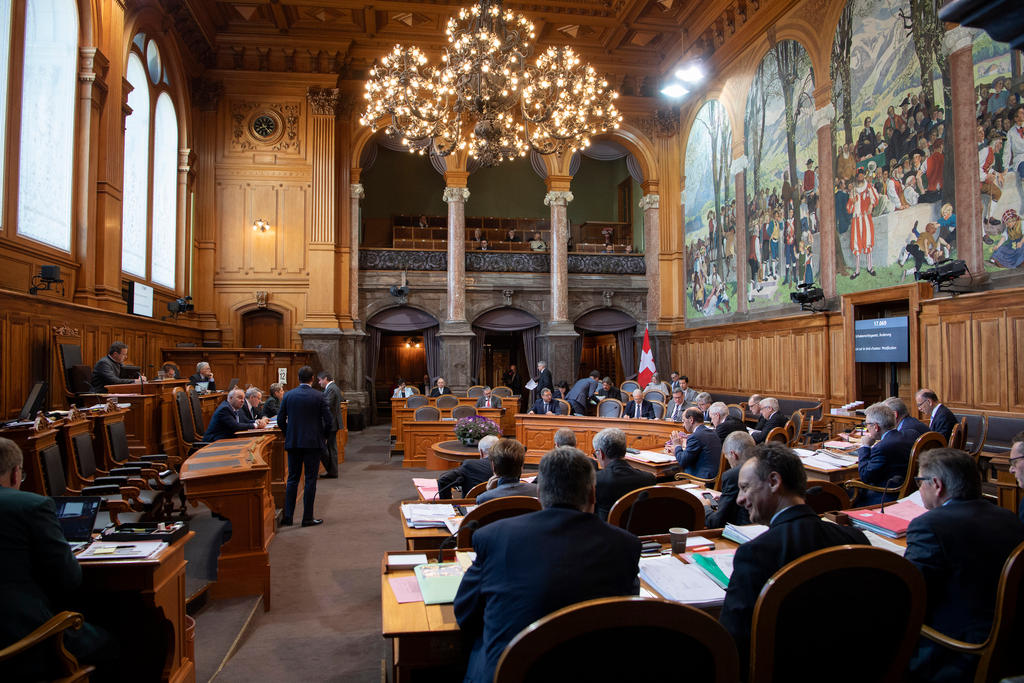Corporate responsibility divides business and civil society

A broad alliance of civil society groups is seeking to establish new rules for Swiss-based companies doing business abroad. Voters decide on their initiative on November 29.
It represents the culmination of over ten years of campaigning for human rights and environmental protection by Swiss non-governmental organisations, which are supported mainly by the political left.
The vote is seen as potentially harmful for Swiss multinationals and the country’s economy, as it puts a spotlight on ethical business standards and allegedly improper practices.
Similar issues are being raised in a proposed investment ban on arms manufacturing firms, which also comes to a nationwide vote in Switzerland on November 29.
The so-called ‘responsible business’ initiative specifically wants to make Swiss companies accountable for their business activities abroad that threaten human rights and the environment.
Rights violations, including abusive child labour or toxic emissions harmful for the environment, could be reasons for legal action.
As part of their due diligence obligations, Swiss companies must review all their business activities to identify potential risks to people and the environment. Firms must take effective measures to combat negative impacts and have to report regularly on what has been implemented.
One of the main sticking points of the initiative is to what extent Swiss-based firms can be made liable for damages caused by their practices.
There is disagreement notably over whether all Swiss small- and medium-sized companies would fall under the same legislation as multinationals headquartered in Switzerland.
Another open question is how the proposed law will be implemented by companies abroad which are under the control of – but not owned by – a Swiss-based firm. Equally controversial is the so-called reversal of evidence. This is the principle whereby a firm accused of a rights violation has to credibly prove they have taken adequate steps to be exempted from liability.
Experts say these points might well end up at the centre of future political debates in Switzerland if the initiative passes at the ballot box, as it would be up to parliament to hammer out detailed legislation to implement the initiative.
Parliament has already approved a watered-down legal amendment on corporate responsibility if the initiative is rejected.
Supporters say numerous cases of corporate injustice abroad – ranging from catastrophic working conditions to failure to protect the environment – by Swiss-based firms, particularly in the commodities sector, make action inevitable.
They say Swiss companies have a moral obligation to adhere to principles on business and human rights adopted by the United NationsExternal link in 2011.
Non-binding agreements and national awareness campaigns are not sufficient, the initiative campaigners argue.
They reject allegations that Switzerland’s small and medium-sized businesses – the backbone of the Swiss economy – would be hard hit by new accountability rules.
For their part, opponents say the initiative makes extreme demands and weakens the competitive edge of Swiss companies at a time when the economy is being hit hard by the Covid-19 crisis.
They have warned of possible job losses in Switzerland as multinationals might decide to give up their headquarters to move elsewhere amid concerns about a wave of legal disputes.
They also argue that support for the initiative would prompt companies to reduce investment in the infrastructure of emerging economies and development countries where they do business.
A parliamentary counter-proposal, which excludes liability, would be a practical alternative option to improve environmental protection and combat human rights abuses, according to opponents.
In 2016, the campaigners handed in over 120,000 signatures collected within 18 months to force a nationwide vote on the issue.
The people’s initiative came in the wake of a non-binding petition by a coalition of NGOs four years earlier which called on the Swiss authorities to ensure Swiss-based firms respect human rights and environmental standards in their business practices worldwide.
But neither the petition to the Swiss authorities nor proposals launched in parliament had much of an impact, according to the NGOs.
Drawn-out procedures in parliament, including efforts to draft alternative options, took until 2019 before a date for a nationwide vote was set.
It will take both a majority of voters and the country’s 26 cantons for the initiative to pass at the ballot box on November 29.
Under the Swiss system of direct democracy, voters’ approval of a people’s initiative leads to a change in the country’s constitution, prompting a series of legal amendments to be decided by parliament at a later stage.
Launched by a group of 60 civil society organisations, the initiative typically pits the political left against the right, including the business community.
The political centre is divided, with several parties or prominent members siding with the initiative supporters.
The business community is not united either. There have been disagreements between the Swiss Business Federation (economiesuisse), which represents large companies, and other associations.
The civil society involvement in the campaign ranges from rights groups, women’s associations, trade unions and church communities.
Both the government and parliament recommend voters reject the initiative.
If voters approve the proposal, Switzerland will have the strictest liability rules compared with other countries, the government says.
However, supporters say the initiative would allow Switzerland to join a group of other European countries with similar legislation.
France, Italy and Britain have introduced laws about corporate responsibility and liability. Other countries are planning such steps. Efforts are underway in the European Union to streamline regulations next year.
The issue of corporate responsibility has been in the news for more than a decade in Switzerland and the vote on November 29 is seen as crucial for Switzerland’s business community.
Political scientists have compared the corporate responsibility initiative with previous attempts to rein in perceived business excesses, notably the successful initiative on executive pay in 2013.
The campaigners chose to target and involve interest groups, including academics and centrist politicians and entrepreneurs, from an early stage.
An alliance of more than 130 groups from civil society have come out in favour of the initiative. The activities of representatives of the country’s main two churches, Roman Catholics and Protestants, are unusual in Swiss politics.
Flags outside private homes showing support for the initiative give the campaign an unusual visibility.
Reports say opponents are investing about CHF8 million ($8.8 million) to fight the initiative, but exact figures are not available as there is no transparency about political funding in Switzerland. Initiative campaigners say they don’t have a major sponsor but the support of volunteers and thousands of small contributors.

In compliance with the JTI standards
More: SWI swissinfo.ch certified by the Journalism Trust Initiative















You can find an overview of ongoing debates with our journalists here . Please join us!
If you want to start a conversation about a topic raised in this article or want to report factual errors, email us at english@swissinfo.ch.